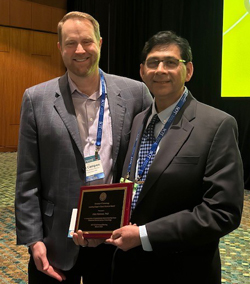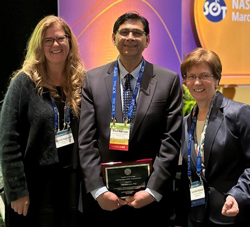News
The 2023 SOT Leading Edge in Basic Science Award Recognizes Irfan Rahman for His Contributions to Pulmonary Toxicology and Specifically How E-Cig and Cigarette Smoke Causes Lung Injury and Disease
Thursday, April 6, 2023
 This award recognizes a scientist who, based on research, has made a recent (within the last five years), seminal scientific contribution/advance to understanding fundamental mechanisms of toxicity. The recipient should be a respected basic scientist whose research findings are likely to have a pervasive impact on the field of toxicology.
This award recognizes a scientist who, based on research, has made a recent (within the last five years), seminal scientific contribution/advance to understanding fundamental mechanisms of toxicity. The recipient should be a respected basic scientist whose research findings are likely to have a pervasive impact on the field of toxicology.
 Irfan Rahman, PhD, has received the 2023 Society of Toxicology (SOT) Leading Edge in Basic Science Award for his contributions and advances in pulmonary toxicological sciences, specifically for his unwavering commitment to investigating how electronic cigarettes and cigarette smoke cause lung injuries and disease in humans, focusing on the fundamental alterations of DNA damage and cellular senescence. As part of this award, Dr. Rahman will deliver the Leading Edge in Basic Science Award Lecture on Tuesday, March 21, 12:30 pm–1:30 pm during the 2023 SOT Annual Meeting and Tox Expo.
Irfan Rahman, PhD, has received the 2023 Society of Toxicology (SOT) Leading Edge in Basic Science Award for his contributions and advances in pulmonary toxicological sciences, specifically for his unwavering commitment to investigating how electronic cigarettes and cigarette smoke cause lung injuries and disease in humans, focusing on the fundamental alterations of DNA damage and cellular senescence. As part of this award, Dr. Rahman will deliver the Leading Edge in Basic Science Award Lecture on Tuesday, March 21, 12:30 pm–1:30 pm during the 2023 SOT Annual Meeting and Tox Expo.
 Dr. Rahman holds a PhD in biochemistry on neutrophil functions in hypertension. He completed a postdoctoral fellowship on lung toxicology at the University of Miami and Georgetown University before relocating to the University of Edinburgh, where he focused on environmental agents and lung inflammation and received an appointment as a Senior Research Scientist/Lecturer. In 2003, Dr. Rahman joined the faculty of the University of Rochester Medical Center Department of Environmental Medicine where he has risen through the faculty ranks with appointments with the Department of Public Health Sciences, Division of Pulmonary and Critical Care Medicine, and Eastman Institute for Oral Health. Since 2018, he has been the Director of the Center for Inhalation and Flavoring Toxicological Research.
Dr. Rahman holds a PhD in biochemistry on neutrophil functions in hypertension. He completed a postdoctoral fellowship on lung toxicology at the University of Miami and Georgetown University before relocating to the University of Edinburgh, where he focused on environmental agents and lung inflammation and received an appointment as a Senior Research Scientist/Lecturer. In 2003, Dr. Rahman joined the faculty of the University of Rochester Medical Center Department of Environmental Medicine where he has risen through the faculty ranks with appointments with the Department of Public Health Sciences, Division of Pulmonary and Critical Care Medicine, and Eastman Institute for Oral Health. Since 2018, he has been the Director of the Center for Inhalation and Flavoring Toxicological Research.
The research program that Dr. Rahman has developed unites the fields of circadian biology, chromatin remodeling, inflammation, sirtuin1 deacetylase (SIRT1) dynamics, and oxidants related to the impact of tobacco products on lung toxicology. He has been a longstanding pioneer with seminal contributions and cutting-edge research on mitophagy, steroid resistance, and lung cellular senescence and is a leader in the role of oxidative stress and redox signaling in gene transcription in tobacco-related pulmonary diseases. In addition, he also has been a leader in the molecular biology of chromatin remodeling and cellular senescence in the lung in response to oxidative stress and cigarette smoke and was the first to show chromatin remodeling and cellular senescence in the lung in response to cigarette smoke. He has identified several exciting potential therapies that could prevent tobacco-related lung complications from progressing.
 Dr. Rahman’s mechanistic discoveries and experience translated rapidly to address major issues for human health in the past five years, namely COVID-19 and e-cigarette toxicity. Of critical importance, he is constantly evolving his research to meet the challenging landscape of tobacco/e-cigarette products for lung health. For example, with regard to the rapid emergence of e-cigarettes in the high school population and the hookah waterpipe tobacco bars in college communities, Dr. Rahman already has published several papers on these products. During the pandemic, Dr. Rahman worked on COVID-19 biospecimens and showed that smokers/vapers are more susceptible to infection and are more likely to develop strong lung inflammatory response via upregulation of ACE2 via nicotine receptor alpha 7, particularly in older individuals.
Dr. Rahman’s mechanistic discoveries and experience translated rapidly to address major issues for human health in the past five years, namely COVID-19 and e-cigarette toxicity. Of critical importance, he is constantly evolving his research to meet the challenging landscape of tobacco/e-cigarette products for lung health. For example, with regard to the rapid emergence of e-cigarettes in the high school population and the hookah waterpipe tobacco bars in college communities, Dr. Rahman already has published several papers on these products. During the pandemic, Dr. Rahman worked on COVID-19 biospecimens and showed that smokers/vapers are more susceptible to infection and are more likely to develop strong lung inflammatory response via upregulation of ACE2 via nicotine receptor alpha 7, particularly in older individuals.
Dr. Rahman’s publications list consists of 225 original papers, 90 reviews, and 25 book chapters with an h-index of 110 with more than 50,000 citations; he also was selected for a list of Highly Cited Researchers by Thomson Reuters in 2014, 2015, and 2016. He has been recognized internationally and is ranked 16 of 52,718 active respiratory and allergy researchers by Ioannidis et al. (2020) He is the editor and author of Inflammation, Aging, Diet, and Nutrition, a book published by Elsevier in 2013. During his career, he has held 21 Associate Editor and Editorial Board memberships and has reviewed articles for more than 50 journals. In addition, he is the Principal Investigator on four National Institutes of Health grants.
 Dr. Rahman has devoted his career to teaching, understanding, and the prevention/treatment of smoking-related lung diseases. Over the years Dr. Rahman has mentored eight full-time graduate students, 30 postdoctoral scholars, and four undergraduate students, several of whom are now prominent faculty members at various institutions.
Dr. Rahman has devoted his career to teaching, understanding, and the prevention/treatment of smoking-related lung diseases. Over the years Dr. Rahman has mentored eight full-time graduate students, 30 postdoctoral scholars, and four undergraduate students, several of whom are now prominent faculty members at various institutions.
Dr. Rahman has attended the SOT Annual Meeting and ToxExpo regularly since 2003 and has been an SOT member since 2005. He has continuously provided leadership in SOT, serving as a Councilor and President of the SOT Inhalation and Respiratory Specialty Section. He also has been involved in the American Thoracic Society as a Program Committee member for the Respiratory Cell and Molecular Biology (RCMB) Assembly and created the Lung Aging Research Interest Group in the RCMB Assembly. In 2022, he received an American Thoracic Society Recognition Award for Scientific Accomplishments.
#Communique:SOTNews
#Awards
#Members
Dr. Irfan Rahman interview with Forbes Magazine
Wednesday, February 22, 2023
Your Guide To CBD Vaping: Safety, Side Effects And More
 While the prevalence of cigarette smoking declined significantly in the past two decades, vaping is on the rise. An estimated 5.66 million adults in the U.S. vape, according to a 2020 JAMA Network scientific paper[1]. Perhaps most alarming, over 2.5 million high school and middle school students vape, reports the 2022 National Youth Tobacco Survey from the Food and Drug Administration (FDA) and Centers for Disease Control and Prevention (CDC)[2].
While the prevalence of cigarette smoking declined significantly in the past two decades, vaping is on the rise. An estimated 5.66 million adults in the U.S. vape, according to a 2020 JAMA Network scientific paper[1]. Perhaps most alarming, over 2.5 million high school and middle school students vape, reports the 2022 National Youth Tobacco Survey from the Food and Drug Administration (FDA) and Centers for Disease Control and Prevention (CDC)[2].
The dangers of e-cigarettes are well documented, but the effects of vaping cannabidiol (CBD) aren’t common knowledge. CBD is often heralded in the wellness space as a natural way to help alleviate symptoms of anxiety and depression, relieve pain and improve sleep. However, these potential benefits can lead to confusion surrounding the health and safety of vaping the cannabinoid. Below, experts explain the science behind how vaping CBD affects the body and whether it’s a habit to engage in or avoid.
Read More: Dr. Irfan Rahman interview with Forbes MagazineCenter Director Paige Lawrence weighs in on heavy metals in dark chocolate
Tuesday, February 14, 2023
Dr. B. Paige Lawrence was featured in a WXXI story addressing recent concerns about cadmium and lead in dark chocolate.
https://www.wxxinews.org/local-news/2023-02-12/cadmium-and-lead-found-in-dark-chocolate